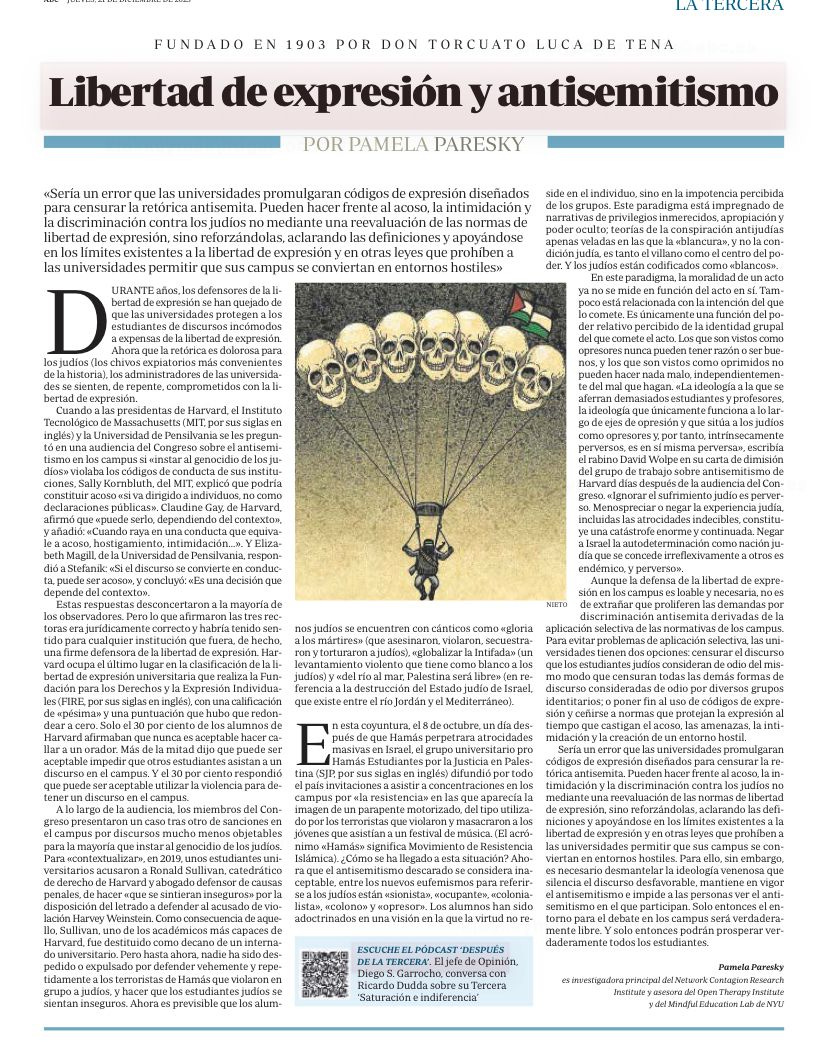The Oldest Newspaper in Madrid Wonders About Campus Expressions of The Oldest Hatred
Libertad de expresión y antisemitismo
This chilling image by J.M. Nieto is from an article I wrote for ABC, the oldest newspaper in Madrid and the second-largest general-interest newspaper in Spain. They titled my piece “Libertad de expresión y antisemitismo.” The English translation is below. (To read it in Spanish, an image of the piece as it appears in print is at the bottom — slightly edited for length, from what I understand.)
Freedom of Expression and Antisemitism
By Pamela Paresky
For years, free speech advocates have complained about universities shielding students from uncomfortable speech at the expense of freedom of expression. Now that the speech is painful to Jews—history’s most convenient scapegoats—university administrators are suddenly committed to freedom of speech.
When the presidents of Harvard, the Massachusetts Institute of Technology (MIT), and the University of Pennsylvania (Penn) were asked at a Congressional hearing about campus antisemitism whether “calling for the genocide of Jews” violated their schools’ codes of conduct. MIT’s Sally Kornbluth explained that it could constitute harassment “if targeted at individuals, not making public statements.” Harvard’s Claudine Gay said “it can be, depending on the context,” adding, “When it crosses into conduct that amounts to bullying, harassment, intimidation...” And Penn’s Elizabeth Magill told Stefanik, “If the speech turns into conduct, it can be harassment,” adding, “It’s a context-dependent decision.”
These responses were baffling to most observers. But what the three presidents said was legally accurate and would have made sense for any institution that was, in fact, a staunch defender of freedom of speech. As legal scholar Ilya Shapiro recently explained, according to U.S. law, “sometimes ‘speech’ isn’t speech. Sometimes it rises to the level of conduct that prevents others from being able to live their lives.” But because the three campuses over which they preside have been so inhospitable to speakers who express views contrary to campus orthodoxy, nobody was buying what they were selling.
Harvard has the distinction of coming in dead last in the Foundation for Individual Rights and Expression (FIRE) college free speech rankings—with a rating of “abysmal” and a score that had to be rounded up to zero. Only 30% of Harvard students said it is never acceptable to shout down a speaker. More than half said it can be acceptable to block other students from attending a campus speech. And fully 30% said it can be acceptable to use violence to stop a campus speech.
Throughout the hearing, members of Congress provided case after case of campus sanctions for speech far less objectionable to most than calling for the genocide of Jews. For “context,” in 2019, Harvard law professor and criminal defense attorney Ronald Sullivan, was accused by undergraduates of making them “feel unsafe” because of his willingness to defend accused rapist Harvey Weinstein. As a result, Sullivan, among the most accomplished scholars at Harvard, was terminated as dean of an undergraduate residential college. But so far, no one has been fired or expelled for making Jewish students feel unsafe by vocally and repeatedly defending Hamas terrorists who violently gang-raped Jews.
Jewish students are now expected to regularly encounter chants like “glory to the martyrs” (who murdered, raped, kidnapped, and tortured Jews), “globalize the intifada” (a violent uprising that targets Jews), and “from the river to the sea, Palestine will be free” (referring to the destruction of the Jewish state of Israel, which exists between the Jordan River and the Mediterranean Sea). The fact is that Jewish students across the country, and especially at highly selective, elite institutions, are expected to face the discomfort of hateful speech when other groups are not.
It was in this climate that on October 8th, one day after Hamas perpetrated mass atrocities in Israel, across the country, the pro-Hamas campus group Students for Justice in Palestine (SJP) disseminated invitations to campus rallies for “the resistance” appeared featuring an image of a motorized paraglider—the kind used by the terrorists who raped and slaughtered young people at a music festival. (The acronym, “Hamas” stands for the Islamic Resistance Movement.)
According to a Harvard/Harris poll, 62% of 18-24-year-old Americans accurately identify the October 7 terrorist attacks on Israeli civilians as genocidal, and 68% understand that Hamas terrorists raped and beheaded people, and murdered entire families, including children and babies. Yet more than half say the terrorist attacks can be justified. And almost half say they side with the terrorists.
How did this come about? Now that naked antisemitism is considered unacceptable, the new euphemisms for Jews include “Zionist,” “occupier,” “colonialist,” “settler,” and “oppressor.” Students have been indoctrinated into a worldview in which the locus of virtue is not the individual, but the perceived powerlessness of groups. This paradigm is infused with narratives of unmerited privilege, appropriation, greed, and hidden power—thinly veiled anti-Jewish conspiracy theories in which “whiteness,” rather than Jewishness, is both the villain and the locus of power. And Jews are coded as “white.”
In this paradigm, the morality of an action is no longer a function of the action itself. Nor is it related to the intention of the actor. It is solely a function of the relative perceived power of the actor’s group-identity. Those seen as oppressors can never be right or good, and those seen as oppressed can do no wrong, regardless of the evil they do. Campus DEI administrations are an outgrowth of this paradigm—and they keep it in place.
“The ideology that grips far too many of the students and faculty, the ideology that works only along axes of oppression and places Jews as oppressors and therefore intrinsically evil, is itself evil,” wrote Rabbi David Wolpe, in his letter of resignation from Harvard’s antisemitism task force days after the Congressional hearing. “Ignoring Jewish suffering is evil. Belittling or denying the Jewish experience, including unspeakable atrocities, is a vast and continuing catastrophe. Denying Israel the self-determination as a Jewish nation accorded unthinkingly to others is endemic, and evil.”
While defending campus freedom of speech is laudable and necessary, it is unsurprising that lawsuits complaining of antisemitic discrimination through selective enforcement of campus policies are proliferating. To avoid selective enforcement issues, university administrations have two options: They can censor speech Jewish students find hateful the way they censor all the other forms of speech considered hateful by various identity groups. Or they can end the use of speech codes and stick to policies that protect speech while punishing harassment, threats, intimidation, and the creation of a hostile environment.
Shortly after testifying, Magill, a scholar of administrative and constitutional law, released a video: “I was focused on our university’s longstanding policies aligned with the U.S. Constitution, which say that speech alone is not punishable,” she said. “I was not focused on—but I should have been—the irrefutable fact that a call for the genocide of Jewish people is a call for some of the most terrible violence human beings can perpetrate. It’s evil plain and simple.” Seeming to suggest that Penn will consider retreating from a commitment to free expression, she added, “These policies need to be clarified and evaluated.” Four days after testifying, she resigned.
It would be a mistake for universities to enact speech codes designed to censor antisemitic speech. They can address antisemitic harassment, bullying, and discrimination not by reevaluating free speech policies, but by strengthening them, by clarifying definitions, and by relying on existing limits to freedom of speech and other laws that prohibit universities from allowing their campuses to become hostile environments. Doing that, however, requires dismantling the poisonous ideology that silences disfavored speech, keeps antisemitism in place, and blinds people to the antisemitism in which they participate. Only then can campus speech climates be truly free. And only then can all students truly flourish.






I am a free speech absolutist, with exception of yelling “fire” in theater because direct result of said speech is likely to be harm, in this case the trampling of humans. I have another exception, which is the call for violence; “I want everyone to punch hypothetical John Doe on Market street”. Genocide is definitely an act of violence.